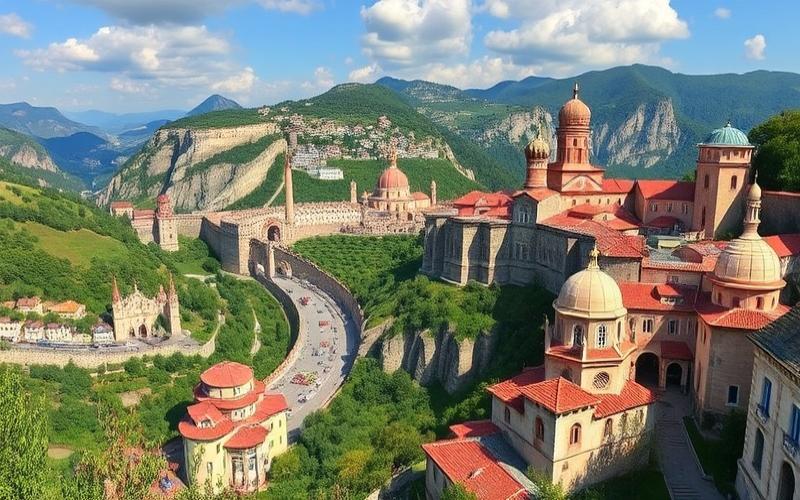
 Published on and written by Cyril Jarnias
Published on and written by Cyril Jarnias
With the European Union setting ambitious goals to achieve carbon neutrality, Bulgaria finds itself at a strategic turning point, particularly in the real estate sector. The country is striving to align with new energy requirements that are transforming not only the landscape of new construction but also the renovation of older buildings. For investors and property owners, understanding these regulations becomes crucial as rigorous energy efficiency standards emerge. At the heart of this transformation lies the opportunity to explore innovative technologies and sustainable materials, while benefiting from European financial support aimed at fostering this ecological transition.
New Energy Regulations for Real Estate in Bulgaria
Evolution of Bulgaria’s Energy Regulatory Framework
Bulgaria has recently implemented new energy regulations for the real estate sector, marking a major turning point in its environmental policy. These measures aim to improve the energy efficiency of residential and commercial buildings while reducing the country’s carbon footprint. The Bulgarian government has set ambitious targets, including a 25% reduction in energy consumption by 2025 compared to 2020 levels.
National Energy Efficiency Goals
The new regulations are part of a broader strategy to promote sustainable development and reduce the country’s energy dependence. The Bulgarian government aims to increase the country’s energy efficiency by 25% and reduce its energy consumption by half by 2025, compared to 2020 levels. These ambitious goals require significant transformation of the existing building stock and new standards for future construction.
Specific Standards and Requirements for Property Owners and Developers
Property owners and real estate developers must now comply with stricter energy efficiency standards. New constructions must achieve at minimum energy class B, while major renovations must aim for class C or higher. These requirements apply to both residential and commercial buildings.
- Mandatory installation of high-efficiency heating and cooling systems
- Use of high-performance thermal insulation materials
- Integration of renewable energy sources, such as solar panels, into building design
- Implementation of smart energy management systems
Impact on the Bulgarian Real Estate Market
These new regulations will undoubtedly have a significant impact on the Bulgarian real estate market. In the short term, we can expect an increase in construction and renovation costs, which could affect real estate prices. However, in the long term, these measures should lead to reduced energy costs for occupants and increased value for more energy-efficient properties.
Innovative Solutions and Technologies for Compliance
To comply with these new requirements, the Bulgarian real estate sector is turning to innovative solutions:
- Use of eco-friendly building materials with high thermal performance
- Integration of heat recovery systems in ventilation systems
- Deployment of triple-glazed windows and smart facades
- Adoption of LED lighting technologies and occupancy sensors
Government Incentives and Subsidies
To facilitate the transition to more energy-efficient buildings, the Bulgarian government has implemented several incentive programs:
- Subsidies covering up to 70% of total cost for installation of residential photovoltaic systems up to 10 kWp
- Full funding for solar water heater installation, up to a maximum of 1,961 BGN
- Low-interest loan programs for energy renovations of multi-family housing
These measures aim to encourage property owners and developers to invest in energy efficiency while stimulating innovation in the construction sector.
Good to Know:
Since 2023, Bulgaria has strengthened its energy regulations for real estate to achieve its sustainability goals, requiring property owners and developers to implement better thermal insulation and integrate energy-efficient systems such as solar panels and biomass boilers. The new standards mandate a 30% reduction in energy consumption for renovated or new buildings, a step toward meeting long-term European carbon neutrality objectives. These measures are expected to boost the green technology market, promoting innovations like smart metering, which is essential for effective energy management. To encourage this transition, the Bulgarian government offers various subsidies and financial incentives, including tax credits for energy-efficient equipment, creating an attractive opportunity for real estate investors. These changes, while requiring initial commitment, could help increase property values and appeal to environmentally conscious buyers.
Understanding Energy Performance Certificate Requirements in Bulgaria by 2025
The Energy Performance Certificate in Bulgaria: An Essential Tool for Energy Efficiency
The Energy Performance Certificate (EPC) is a document that assesses the energy and climate performance of a property by measuring its energy consumption and environmental impact. In Bulgaria, this tool is part of the European energy policy aimed at reducing building energy consumption and limiting greenhouse gas emissions.
Current Regulations and Planned Changes by 2025
Currently, Bulgaria applies European directives on building energy performance. However, the Bulgarian government plans to strengthen these regulations by 2025. The proposed changes include introducing stricter energy classes and requiring all existing buildings to meet a minimum energy performance level.
Bulgarian Government Objectives
The Bulgarian government has set ambitious energy efficiency goals for the real estate sector:
- Increase investments in energy infrastructure
- Improve energy efficiency and accelerate decarbonization
- Support construction of new nuclear and hydroelectric units
- Focus on energy supply security
Impact on the Bulgarian Real Estate Market
The introduction of these new requirements will have a significant impact on the Bulgarian real estate market. Property owners and developers will need to invest in energy renovations, which could lead to increased costs in the short term. However, these investments should result in long-term energy savings and increased property values.
Expected environmental benefits include significant reduction in greenhouse gas emissions and improved overall energy efficiency of the Bulgarian building stock.
Recommendations for Real Estate Market Players
To prepare for these new requirements, property owners and real estate professionals should:
- Anticipate changes by conducting energy audits of their properties
- Plan and budget for necessary energy renovation work
- Train in new energy efficiency technologies and techniques
- Take advantage of opportunities offered by government funding programs for energy renovation
By adopting a proactive approach, Bulgarian real estate market players will not only comply with new regulations but also benefit from the economic and environmental advantages associated with improved energy efficiency.
Good to Know:
The Energy Performance Certificate (EPC) in Bulgaria assesses building energy efficiency and will become crucial by 2025. Currently, the EPC is not mandatory, but the Bulgarian government aims to strengthen requirements to improve energy efficiency, aligning its regulations with those of the European Union. By 2025, all buildings will need to obtain an energy performance certificate, which could lead to additional costs for property owners and developers, but these costs will be offset by reduced energy bills and potential increases in property value. These measures will contribute to reducing carbon emissions, which is crucial for meeting climate goals. Property owners and real estate professionals should prepare now by conducting energy audits and proceeding with renovations to comply with future standards. Preparing in advance will avoid penalties and align their practices with future regulatory expectations while benefiting from the advantages of more energy-efficient buildings.
Energy Renovation: What Obligations Do Bulgarian Property Owners Have?
New Regulations for Building Energy Efficiency in Bulgaria
The Bulgarian government has recently implemented strict regulations aimed at improving building energy efficiency in the country. These measures are part of national efforts to reduce energy consumption and greenhouse gas emissions.
Among the main requirements is the obligation for property owners with homes classified F or G on the energy performance scale to carry out renovation work to achieve at minimum class C. Required work typically includes wall, roof, and floor insulation, replacement of windows and doors, and installation of more efficient heating and ventilation systems.
Property owners have until January 1, 2028, to bring their properties into compliance. After this deadline, financial penalties will be applied, which can reach up to 5,000 leva (approximately 2,500 euros) per year for non-compliant homes.
Financial Incentives and Impact on the Real Estate Market
To encourage renovations, the Bulgarian government has implemented several financial assistance programs. The Energy Efficiency and Renewable Sources Fund offers preferential rate loans and guarantees for energy renovation projects. Additionally, property owners can benefit from grants covering up to 50% of work costs under the “Growing Regions” Operational Program.
These new requirements are having a significant impact on the Bulgarian real estate market. Property owners face significant renovation costs, estimated on average between 15,000 and 30,000 leva (7,500 to 15,000 euros) per home. However, renovated properties are gaining attractiveness, with their market value increasing by up to 20%.
Testimonials and Perspectives
Ivan Petrov, a Sofia apartment owner, testifies: “Initially, I was hesitant because of the work costs. But after the renovation, my energy bills were cut in half and my apartment is much more comfortable.”
According to Maria Dimitrova, an energy efficiency expert: “These regulations are necessary to modernize Bulgaria’s largely aging building stock. They will help reduce energy poverty and improve residents’ quality of life.”
Stoyan Ivanov, from the Ministry of Energy, emphasizes: “Our goal is to achieve a 30% reduction in energy consumption in the residential sector by 2030. These measures are essential to achieve this.”
Challenges and Opportunities
Implementing these regulations presents significant challenges, particularly in terms of funding and the technical capacity of the construction sector. However, they also offer significant opportunities for developing an energy renovation market in Bulgaria, stimulating innovation and creating jobs in the building sector.
Bulgarian authorities estimate that these measures will enable the renovation of approximately 60% of the building stock by 2030, thus significantly contributing to the country’s climate goals.
Good to Know:
Since 2023, Bulgaria has required property owners to comply with strict energy efficiency standards, targeting significant reductions in energy consumption by 2030. Required work includes thermal insulation, modernization of heating systems, and installation of double-glazed windows, with compliance deadlines varying according to building characteristics. Property owners benefit from financial incentives such as grants covering up to 50% of costs but face fines for non-compliance. These measures increase initial costs for property owners but revitalize the Bulgarian real estate market by increasing the value and attractiveness of renovated properties. According to testimonials, property owners appreciate long-term savings on energy bills, while experts highlight challenges related to funding and implementation of renovations. Government representatives also emphasize the unique opportunity these new standards offer for modernizing the country’s building stock.
Disclaimer: The information provided on this website is for informational purposes only and does not constitute financial, legal, or professional advice. We encourage you to consult qualified experts before making any investment, real estate, or expatriation decisions. Although we strive to maintain up-to-date and accurate information, we do not guarantee the completeness, accuracy, or timeliness of the proposed content. As investment and expatriation involve risks, we disclaim any liability for potential losses or damages arising from the use of this site. Your use of this site confirms your acceptance of these terms and your understanding of the associated risks.

































































